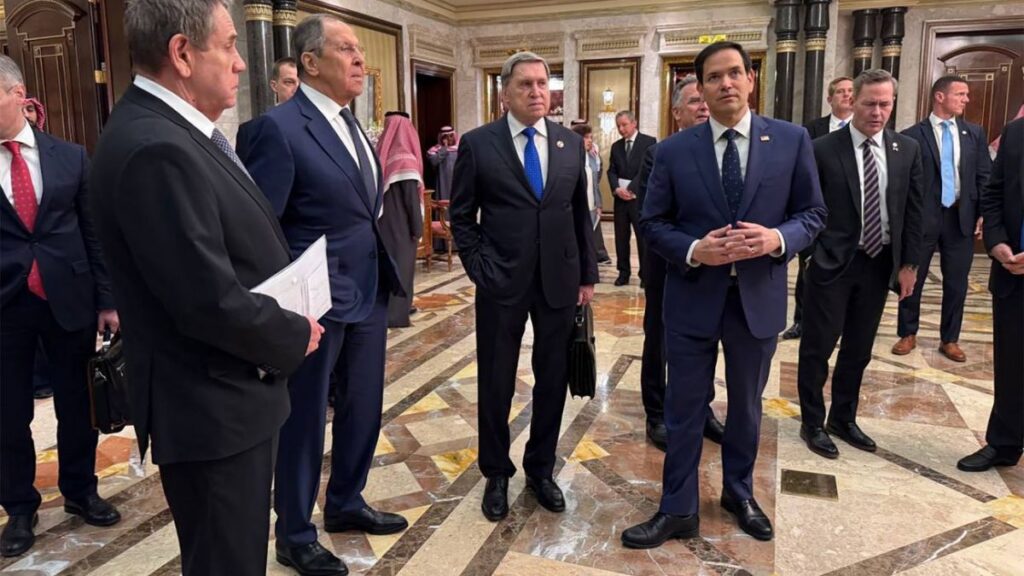Riyadh (Agencies): In a significant diplomatic development, high-level delegations from the United States and Russia held a 4.5-hour meeting in Riyadh on Tuesday, marking the first direct talks in years aimed at resolving the ongoing Ukraine conflict and improving strained bilateral relations. The meeting, held at Al Diriyah Palace, brought together key officials from both sides and resulted in agreements to establish a consultation mechanism and initiate discussions on ending the Ukraine crisis.

The Russian delegation was led by Foreign Minister Sergei Lavrov, Presidential Aide Yury Ushakov, and CEO of the Russian Direct Investment Fund (RDIF) Kirill Dmitriev. On the US side, Secretary of State Marco Rubio, National Security Adviser Mike Waltz, and Special Envoy for the Middle East Stephen Witkoff participated in the negotiations.
Following the meeting, Russia’s chief foreign policy adviser Yuri Ushakov described the discussions as “serious” and confirmed that both sides agreed to appoint high-level teams to begin working on a sustainable resolution to the Ukraine conflict. While Dmitriev cautioned that it was “too early to talk of compromises,” he noted that the dialogue marked a shift toward mutual respect and understanding between the two nations.
A statement from the US State Department highlighted that both sides will work on addressing issues that have strained their diplomatic missions and collaborate on matters of mutual geopolitical and economic interest. There was also a brief discussion on the potential for a future summit between Russian President Vladimir Putin and former US President Donald Trump, though Ushakov downplayed the possibility of it occurring soon.
- China Welcomes Peace Efforts
Reacting to the talks, China expressed its support for all efforts aimed at resolving the Ukraine crisis through political dialogue. Chinese Foreign Ministry spokesperson Guo Jiakun reiterated that China is committed to promoting peace and would continue to engage with all relevant parties. “We welcome dialogue between the US and Russia and support political and diplomatic efforts for a peaceful resolution,” Guo stated.
Analysts in China emphasized that a lasting solution requires addressing the root causes of the conflict, particularly NATO’s expansion in Eastern Europe. “Without tackling the underlying security concerns, any ceasefire discussions will remain incomplete,” said Li Haidong, a professor at China Foreign Affairs University.
- Ukraine and Europe Express Concern
Notably, Ukrainian officials were absent from the Riyadh talks, a point that has fueled concerns in Kyiv and among European allies. Ukrainian President Volodymyr Zelensky dismissed the meeting’s outcomes, insisting that his government would not accept any decisions made without Ukraine’s participation. Tensions between Kyiv and Washington have grown recently, especially after reports that the Trump administration no longer views NATO membership for Ukraine as a viable solution.
In a possible sign of protest, Ukrainian drones reportedly targeted the Kropotkinskaya oil pumping station, which transports oil for American and European companies. According to Russian media, the strike was interpreted as a direct response to the US-Russia negotiations.
European leaders also expressed unease about being excluded from the talks. French President Emmanuel Macron emphasized the importance of maintaining a unified transatlantic approach. “Working together with Europeans, Americans, and Ukrainians is key to resolving the conflict,” Macron posted on social media platform X. European Commission President Ursula von der Leyen echoed these sentiments, affirming the EU’s commitment to providing financial and military support for Ukraine.
Despite the diplomatic breakthrough between the US and Russia, experts remain skeptical about the feasibility of a long-term resolution without broader international consensus. As talks continue, the complex interplay of geopolitical interests will likely determine the future trajectory of the Ukraine crisis.

